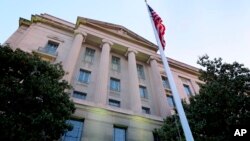At least two Americans believed to have joined the Islamic State terror group have been brought back to the United States to face charges.
Senior administration officials confirmed Tuesday that Ibraheem Musaibli of Dearborn, Michigan, and Samantha ElHassani of Indiana, arrived on U.S. soil Tuesday after U.S. forces escorted them from Syria.
In a statement, the Justice Department said Musaibli, "a natural-born U.S. citizen," would be arraigned in federal court in Detroit on Wednesday.
'Material support to ISIS'
Musaibli is charged with attempting to provide material support to IS, fighting with the terror group from April 2015 until his capture by U.S.-backed Syrian forces in June.
"Musaibli's alleged provision of material support to ISIS put the United States at risk and may have endangered the lives of countless innocent people," John Demers, assistant attorney general for national security, said in a statement that used an acronym for the militant group.
"The indictment in this case serves as a reminder of the danger posed by those who travel overseas to join forces with ISIS," Timothy Slater, FBI special agent in charge, added.
ElHassani has been charged with making false statements to the FBI and will appear in federal court in Hammond, Indiana, at a later date, the Justice Department said Tuesday.
She was accompanied by her four children, two of whom were born in Syria, an official said. Her children are in the care of the Indiana Department of Child Services, a Justice Department statement said.
In media interviews done while in Kurdish custody, ElHassani said her husband, Moussa ElHassani, a Moroccan national, tricked her into accompanying him to Syria while they were vacationing in Turkey in 2015.
"We ended up in Raqqa," she said in an interview with Frontline and the BBC. "The first thing I say to him is, 'You're crazy, and I'm leaving.' And he said, with a big smile on his face, 'Go ahead. You can try, but you won't make it.' "
Moussa ElHassani was reportedly killed while fighting for IS. Samantha ElHassani said she and her four children eventually left Raqqa along with two Yazidi slave girls and ended up in a Kurdish detention camp.
In various media interviews, she has described her time in IS-held territory as harrowing, telling of failed escape attempts.
Her eldest son, Matthew, 10, was featured in an IS propaganda video in which he threatened attacks on the West.
According to a report earlier this year by George Washington University's Program on Extremism, about 70 Americans have traveled to Iraq and Syria and have affiliated with IS or other jihadist groups since 2011.
Of those, 24 are believed to be dead, more than 14 have been apprehended, and the fates of a couple dozen others are still unknown.
European nations
U.S. officials have been pushing for European countries to take back nationals who left to fight with IS and prosecute them, but many have refused.
Earlier Tuesday, a French air force general serving with the anti-IS coalition in Iraq said his government's position had not changed.
"It is quite clear. The government of France has said they don't want these people back," said Brigadier General Frederic Parisot, who also serves as the coalition's director of civil-military operations.
Despite pushing for countries to take back their foreign fighters, U.S. policy on what to do with Americans suspected of fighting for IS has been less than clear.
In June, the U.S. announced it would release an American citizen suspected of being a member of IS in Syria. The Justice Department said it had given the man, who holds dual U.S.-Saudi citizenship, a choice of being released "either in a town or outside an Internally Displaced Persons camp." But that decision has been put on hold, pending further legal action, according to court filings.
The American Civil Liberties Union, which has been representing the man, slammed the decision to release him in what it described as a war zone.
Department of Justice correspondent Masood Farivar contributed to this report.






